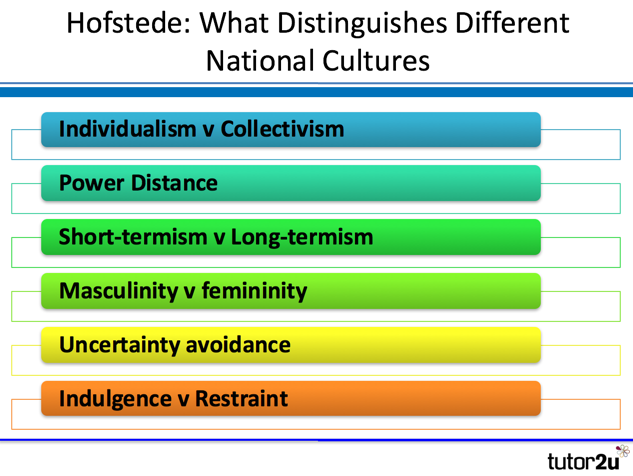Social psychologist Geert Hofstede has conducted extensive research into the different categories of culture that help distinguish the ways business is conducted between different nations.
Hofstede carried out research amongst over 100,000 employees working around the world for IBM.
He attempted to categorise cultures of different nationalities working at IBM
Hofstede has extended the categories to six based on his latest research

Individualism v Collectivism
Some societies value the performance of individuals
For others, it is more important to value the performance of the team
Has important implications for financial rewards at work (e.g. individual bonuses v profit-sharing for bigger groups)
Power Distance
This considers the extent to which inequality is tolerated and whether there is a strong sense of position and status
A high PD score would indicate a national culture that accepts and encourages bureaucracy and a high respect for authority and rank
A lower PD score would suggest a national culture that encourages flatter organisational structures & a greater emphasis on personal responsibility and autonomy
Long-term orientation
This category is concerned with the different emphases national cultures have on the time horizons for business planning, objectives & performance
Some countries place greater emphasis on short-term performance (so-called short-termism), with financial and other rewards biased towards a period of just a few months or years.
Other countries take a much longer-term perspective, which is likely to encourage more long-term thinking.
The key implication of this category is the impact on investment decisions and risk-taking
Masculinity v Femininity
This somewhat unfortunately-named category considers the differences in decision-making style
Hofstede linked what he called a “masculine” approach to a hard-edged, fact-based and aggressive style decision-making
By contrast, ”feminine” decision-making involved a much greater degree of consultation and intuitive analysis
Uncertainty Avoidance
This category essentially considers the different attitudes to risk-taking between countries
Hofstede looked at the level of anxiety people feel when in uncertain or unknown situations
Low levels of uncertainty avoidance indicate a willingness to accept more risk, work outside the rules and embrace change. This might indicate a more entrepreneurial national culture
Higher levels of uncertainty avoidance would suggest more support for rules, data, clarity of roles and responsibilities etc. These cultures might be less entrepreneurial as a consequence
Indulgence v Restraint
Indulgence stands for a society that allows relatively free gratification of basic and natural human drives related to enjoying life and having fun
Restraint stands for a society that suppresses gratification of needs and regulates it by means of strict social norms

No comments:
Post a Comment